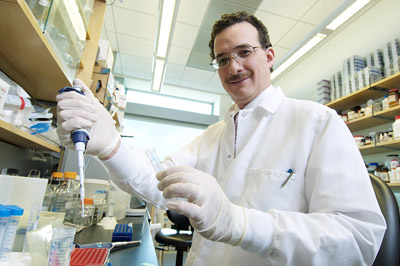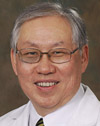
Javier Lopez has received a grant to study the cellular mechanisms involved in enlargement of the heart with the ultimate goal of finding new therapies for heart failure.
Posted April 20, 2011
The Robert Wood Johnson Foundation has recognized UC Davis researcher Javier E. López with a Harold Amos Medical Faculty Development Program grant to further study heart muscle cells, research that could lead to new therapies for treating victims of heart failure.
The four-year, $420,000 grant enables him to study the proteins produced by a small subpopulation of heart-muscle cells in patients with cardiac hypertrophy (enlargement of the heart), a condition frequently seen in heart failure. The proteins arising from this subpopulation of heart-muscle cells may have physiological benefits that make them potentially important targets for future therapies.
“A better understanding of what occurs in cardiac hypertrophy at a cellular level can have enormous implications for developing new heart failure therapies and even regenerating new heart muscle,” said López, who is an assistant professor of cardiovascular medicine. “If we could identify and encourage growth of the cells that are adaptive, we may be able to promote better healing.”
Cardiac muscle enlargement is the heart’s response to stress, disease or injury, such as high blood pressure or a heart attack. The thicker heart muscle functions less effectively, requiring the heart to work harder to pump blood through the body, which then often leads to heart failure.
López is studying the β-myosin heavy chain isoform (β-MyHC) protein, which is a member of a group of fetal genes produced during early development of the heart. After birth, these genes become inactive except in a number of heart diseases. Until recently, scientists believed that the expression of fetal genes was responsible for deteriorating heart muscle during heart failure. But newer research indicates that fetal genes instead may be an adaptive response that potentially should be encouraged by therapeutics.
 “Dr. Lopez brings dedication and skill to this important area of heart research. He is an outstanding young faculty member and a role model for students, housestaff and other faculty exploring innovative ways to tackle the complexities of cardiovascular disease.”
“Dr. Lopez brings dedication and skill to this important area of heart research. He is an outstanding young faculty member and a role model for students, housestaff and other faculty exploring innovative ways to tackle the complexities of cardiovascular disease.”
— Reginald Low
López discovered in preliminary research that β-MyHC is expressed in only about 30 percent of heart-muscle cells in an enlarged heart and that these cells are smaller than the majority of heart cells that do not express the protein. Until this research, scientists were unaware that fetal genes were only expressed in a small population of cells in the heart muscle. With his new grant, López plans to further characterize the two cell populations he identified and their genetic programs.
For his study, López is using flow cytometry, a technique to characterize cells that is commonly used for diagnosing blood cancers. The method allows him to simultaneously measure the size of the cardiac muscle cells and detect cell by cell the presence of β-MyHC, evaluating up to 100,000 cells in 10 minutes. Traditional methods of studying myocytes through a microscope restricts investigators to evaluating only a few thousand cells over hours of painstaking work.
“Using flow cytometry to study myocytes was a real breakthrough because it allowed us to see that adult and fetal genes were active simultaneously in the same heart muscle but in different cell populations,” said López. “If the fetal genes are beneficial in restoring heart-cell function, we may want to selectively encourage the cells that express it.”
According to López, it may one day be possible to use drugs to manipulate the cardiac gene program of a failing heart, or to transplant subpopulations of cardiac cells into the heart and stimulate regeneration of new heart muscle.
“Dr. Lopez brings dedication and skill to this important area of heart research,” said Reginald Low, professor and chief of cardiovascular medicine. “He is an outstanding young faculty member and a role model for students, housestaff and other faculty exploring innovative ways to tackle the complexities of cardiovascular disease. The Harold Amos Medical Faculty Development grant will enable him to further this cutting-edge research.”
Working under the mentorship of UC Davis colleague Nipavan Chiamvimonvat, associate chief for research and associate professor in the Division of Cardiovascular Medicine, the award enables López to devote 80 percent of time to research activities.
The Harold Amos awards program was established by the Robert Wood Johnson Foundation to increase the number of faculty from historically disadvantaged backgrounds who can achieve senior rank in academic medicine and who will encourage and foster the development of succeeding classes of physicians. Lopez hopes his success in research medicine will serve as a model for other Latino students and future physicians.
“Dr. Amos was a pioneer in academic medicine,” said Lopez. “His career, his passion for mentoring and his scientific accomplishments inspired many to embark on careers in medicine. This Amos grant enables me strive for excellence in scientific endeavors while also giving back to my community through the mentoring of young students.”